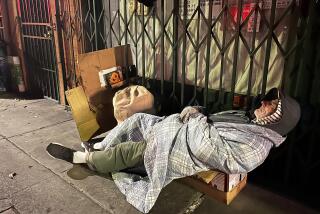NEWS ANALYSIS : Are Bus and Rail Fares Separate and Unequal? : Transit: Though it shocked MTA officials, some say L.A. was ripe for court action over disparities in allocating funds in rich and poor areas.
The decision by a federal judge Thursday to block a bus fare increase--an order that stunned local transit officials--is only the most recent example of government intervention in a longstanding nationwide debate over how public transportation resources are distributed.
For years, critics of mass transit policies nationwide have accused local agencies of spending a higher proportion of tax dollars on transporting affluent white suburbanites than on services in the inner city.
That allegation has forced transit authorities in other major metropolitan areas to roll back fare increases, following a line of reasoning in civil rights law that U.S. District Judge Terry J. Hatter Jr. applied Thursday in issuing a temporary restraining order against the Los Angeles County Metropolitan Transportation Authority.
Indeed, despite the shock of local officials who branded the decision a “reckless ruling” without precedent, some experts say Los Angeles, which operates the nation’s busiest bus system, was ripe for such a case, given the size of the MTA’s operations and the disparities in the subsidies it provides bus and rail passengers.
“It surprises me that it’s taken this long” for such a case to occur in Los Angeles, said John Pucher, professor of urban transportation at Rutgers University in New Jersey. “These equity issues in finance of transit have to be dealt with.”
In response to a class-action lawsuit, Hatter agreed that the MTA’s 25-cent fare increase would pose a hardship for minority and poor residents, who make up the bulk of the MTA’s bus ridership. Hatter set a Sept. 12 hearing to determine whether the agency intentionally slighted its poorest customers in hiking bus fares for the first time in six years as it poured millions of dollars into building new rail projects.
The MTA has asked Hatter and the U.S. 9th Circuit Court of Appeals to stay the restraining order.
The controversy bears a close resemblance to a 1989 Philadelphia case, in which court intervention put local authorities on notice that accusations of racial inequity in the realm of public transport would be taken seriously.
In that case, a lower court judge issued a temporary injunction blocking fare increases after community and riders’ groups complained that the hikes would unfairly penalize poor and minority residents.
Ultimately, a higher court allowed the increases to go forward, but only after nine months of legal wrangling that brought arguments over racial and social equity to the forefront of the debate.
The arguments are the same as those advanced by critics of the MTA, including the coalition of community groups that filed the lawsuit resulting in Thursday’s temporary injunction.
The groups contend that the MTA operates a “separate and unequal system of public transportation,” one for its predominantly poor, nonwhite bus riders and another for its wealthier, white rail customers. The lawsuit accuses the MTA of funneling money to rail projects that could be used to shore up the bus system, and claims that such inequitable practices violate the U.S. Constitution and Civil Rights Act of 1964.
“Transit authorities throughout the country will be watching this process very closely to see the outcome, because . . . the responsibility for setting fares has rested largely with state or local bodies,” said Chip Bishop, a spokesman for the American Public Transit Assn. in Washington. “Normally, it has not brought the intervention of the courts.”
Several scholars agree that Hatter’s temporary injunction against the new fares is unusual . But Richard Ford, a law and urban issues professor at Stanford University, said judicial scrutiny is not an anomaly when arguments over civil rights are introduced.
“It’s not unusual for the courts to step in and remedy discrimination that’s occurring at the hands of the government. And that discrimination has taken the form of unequal distribution of public funds,” he said.
Ford cited the Serrano vs. Priest case in California, which found that the state had been inequitably funding public schools.
Pucher also noted that the federal government intervenes in local transportation matters by attaching numerous rules to the projects it funds. Such requirements include reduced fares for senior citizens and the disabled.
Both the U.S. Department of Transportation and Federal Transportation Administration have civil rights offices, where the public can lodge complaints, as Pucher said happened in a Dallas case.
In the late 1970s, Dallas officials instituted a new bus fare system that inner-city residents said favored affluent suburbanites.
Federal transportation officials found the system in violation of the Civil Rights Act, said Pucher, who worked as a consultant in the case. The city revamped its fare structure, although some officials describe the overhaul as merely part of a regular city review of bus fares.
Experts say the case illustrates the equity arguments that have simmered in the pot of mass transit policy for some time.
“It’s a point that I’ve been making for years,” said UCLA urban planning professor Martin Wachs. “The question is whether the courts have jurisdiction over that, and it now appears they’re saying they do.”
More to Read
Sign up for Essential California
The most important California stories and recommendations in your inbox every morning.
You may occasionally receive promotional content from the Los Angeles Times.










